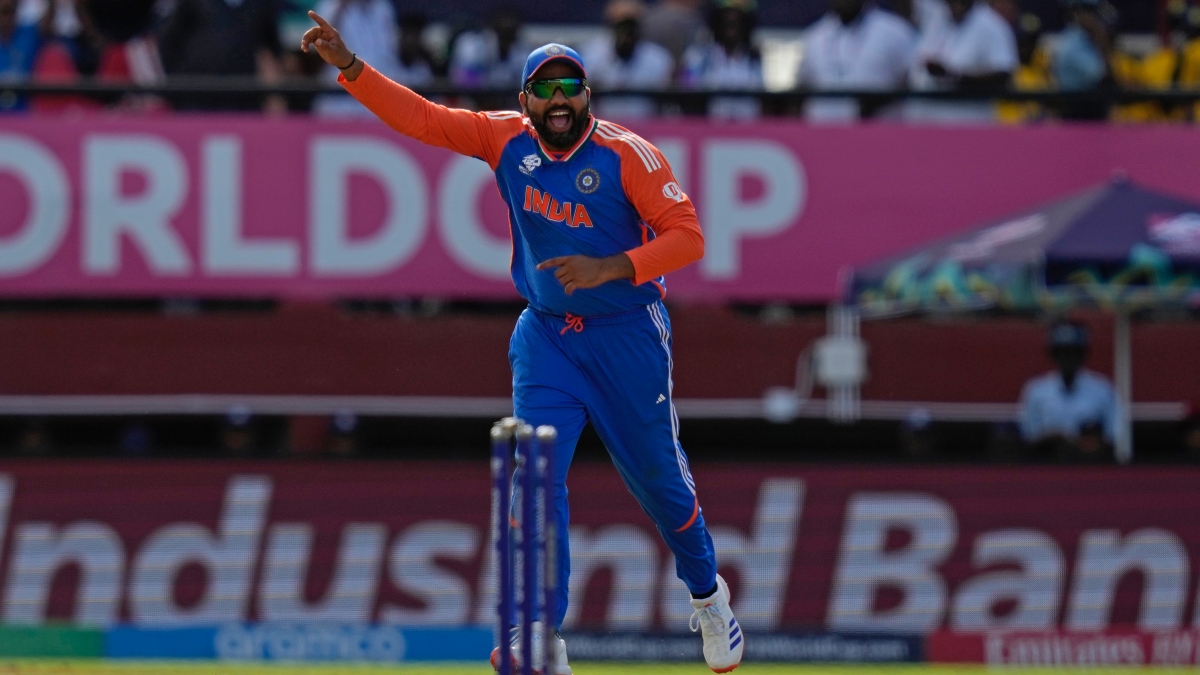In the English dugout, Jos Buttler cut a lonely, distraught, dismayed figure. Head bowed, he stared at the ground under him, not so much hoping for it to open up and swallow him as looking for grains of comfort in the sand at his feet. For the second time in seven and a half months, a title defence he had marshalled had unravelled spectacularly. In October-November in India, defending champions England didn’t even make it to the semi-final of the ODI World Cup. On Thursday in Providence, their aspirations of becoming the first side to successfully defend the T20 World Cup lay in a heap, buried by India’s hunger and ambition , by their flair and efficiency.
T20 World Cup 2024: News | Schedule | Results | Points Table
Some 19 months back, the shoe had been on the other foot. It was Rohit Sharma who looked as if the world had come to an end, moments after his side was lashed by Buttler’s England by ten wickets, also in the semi-final of the T20 World Cup. India then had played like England in this instance, without imagination and creativity, without vim and vigour. It was Rohit’s first outing as captain at a World Cup; suffice to say that it wasn’t an experience to savour.
In the period between that debilitating defeat and now, Rohit has been a vastly influential figure in India’s Phoenix-like rise. With the bat, of course, but with his vision, his leadership, his philosophy, his mantra. Under him and head coach Rahul Dravid, India have gone from a traditional, conservative, brooding mindset to a refreshingly positive and entertaining mantra. The results here, and at the 50-World home World Cup, haven’t come about by accident.
Impact Shorts
More ShortsIn so many ways, this was India’s game to win, and that’s not said with the benefit of hindsight. Introduced to the tournament on treacherous pitches in New York, India were forced to scrap and battle and fight and claw against Pakistan and United States, defending 119 against the former and forced to stretch nearly all sinews in overhauling the latter’s 111. Without their qualification to the Super Eight stage ever being in any doubt, they had been battle-hardened, well prepared for the rigours of the next stage when they would be tested by stronger sides on a consistent basis.
India also got their selection spot-on. They left India believing Kuldeep Yadav would be one of their main assets, but they didn’t hesitate to bench him in New York when it became apparent that pace would hold the key and that they needed Axar Patel and Ravindra Jadeja to lengthen their batting. When they travelled to the West Indies, Kuldeep’s left-arm wrist-spin was immediately pressed into service and Mohammed Siraj left out with Arshdeep Singh winning the nod to be Jasprit Bumrah’s new ball partner because of his ability to swing the ball. Neither of these was an easy call, but Rohit and Dravid haven’t been afraid of making the difficult choices while always keeping the rest of the group in the loop.
Kuldeep has been an X-Factor in the Caribbean with nine wickets from four games, but India have been able to extract performances at different stages from almost everyone in the party with the notable exception of Virat Kohli (75 runs in seven innings after his latest failure). They have maximised Axar’s utility by entrusting him with key responsibilities. Such as bowling in the Powerplay, when the ball is harder, when batting is at its easiest, when the field restrictions offer little margin for error.
Axar has relished this role. From the time he became a Powerplay regular, he has been on top of his game, though he has also been effective at other stages of the innings. Against Pakistan, he conceded just two in the 16th over with Pakistan needing 37 off 30. In Gros Islet against Australia, he bowled a tight second spell of 2-0-9-1 (13th and 15th overs), picking up the wicket of Marcus Stoinis along the way to halt the Aussie chase in its tracks.
On Thursday, Axar dazzled as a Powerplay bowler. Brought on in the fourth with Buttler looking to up the ante, the left-arm spinner picked up a wicket with the first ball of each of his first three overs – Buttler caught behind on the reverse sweep, a dozy Moeen Ali smartly stumped by Rishabh Pant and Jonny Bairstow foxed by one that went on with the arm. Rohit and Suryakumar Yadav, with help from Hardik Pandya, Ravindra Jadeja and Axar himself, had steered India to 171 for seven, 20 more than par for the course. Once Axar completed a match-turning first spell of 3-0-14-3, only the formalities remained to be completed.
This Indian win was one for the collective. Playing like a side that is in complete control of its game plan and with the confidence that comes from defending three successive totals in the Super Eights, India read the conditions perfectly with sustained inputs from Rohit, whose 39-ball stint allowed him a first-hand taste of the vagaries of the track. They came at England with their spinning wealth relentlessly, running through their overs quickly, targeting the stumps in deference to the low bounce, hardly throwing up a loose offering and tightening the screws inch by discernible inch. England knew they were being strangled, but they had no wiggle room. Like India in Adelaide in November 2022, they couldn’t wait for the end to come. Seldom would revenge have tasted sweeter.
)